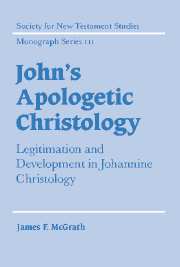Book contents
- Frontmatter
- Contents
- Preface
- Part 1 Introduction
- Part 2 Jesus and God
- 3 Are there ‘two powers’ in John?
- 4 God's equal or God's agent? (John 5)
- 5 ‘I obey, therefore “I am”’ (John 8.12 – 59)
- 6 ‘You are gods’ – but who are ‘you’? (John 10.22 – 39)
- 7 In the bosom of the Father (John 1.1 – 18)
- 8 Conclusion to part 2
- Part 3 Jesus, Moses and Torah
- Part 4 Other issues and conclusion
- 16 Conclusion
- Bibliography
- Index of biblical references
- Index of authors
- Index of subjects
5 - ‘I obey, therefore “I am”’ (John 8.12 – 59)
Published online by Cambridge University Press: 22 September 2009
- Frontmatter
- Contents
- Preface
- Part 1 Introduction
- Part 2 Jesus and God
- 3 Are there ‘two powers’ in John?
- 4 God's equal or God's agent? (John 5)
- 5 ‘I obey, therefore “I am”’ (John 8.12 – 59)
- 6 ‘You are gods’ – but who are ‘you’? (John 10.22 – 39)
- 7 In the bosom of the Father (John 1.1 – 18)
- 8 Conclusion to part 2
- Part 3 Jesus, Moses and Torah
- Part 4 Other issues and conclusion
- 16 Conclusion
- Bibliography
- Index of biblical references
- Index of authors
- Index of subjects
Summary
This is a somewhat extensive passage, but as in the case of John 5, even though much of this passage is correctly regarded as an attempt to defend certain beliefs, not everything is relevant to our specific concern of how the legitimation in which the Fourth Evangelist engaged is linked to his development of inherited beliefs. The need to treat this section of the Gospel in our study is immediately indicated by its strong polemical thrust, which is noted by most scholars, as is its close relation to the Johannine disputes with the synagogue. Neyrey regards the form of John 8 as ‘an elaborate forensic procedure against Jesus’. As in chapter 5, the Johannine Jesus is being ‘put on trial’ by ‘the Jews’, representing the accusation of the contemporaries of the Johannine community against them. Becker classes 8.13–20 together with 5.31–47 and other passages which are about ‘the legitimation of the one who has been sent’. The focus of the dispute is the ‘I am’ statement by Jesus (which is clearly some sort of christological assertion, the meaning of which we will consider below): it is necessary for ‘the Jews’ to accept that Jesus is ‘I am’, or they will die in their sins (8.24); the ‘lifting up’ of Jesus will in some sense demonstrate that Jesus is in fact ‘I am’ (8.28); and in the end it is precisely as ‘I am’ that Jesus is rejected by ‘the Jews’ (8.59).
- Type
- Chapter
- Information
- John's Apologetic ChristologyLegitimation and Development in Johannine Christology, pp. 103 - 116Publisher: Cambridge University PressPrint publication year: 2001



